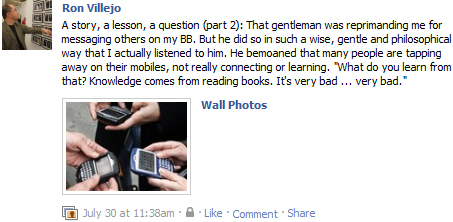I used to read (print) newspapers, The Chicago Tribune being my favorite. It was easy enough to read it, when I was in the living room or at the kitchen table. But on the train, packed with rush hour commuters? Well, that was a bit of a trick.
It’s about holding it in the right places at the margins, and flicking it deftly with your wrists. If you have someone on either or both sides of you, then of course you can’t spread your arms too widely. You can spread them only the width of your shoulders, right. Because that someone to your left and that someone to your right are doing the very same thing you are. Some commuters fold them back in half to read. But the truly space-economical and dextrously-gifted among us fold them into a quarter, and manage to read the whole bloody newspaper like that! The Chicago Sun Times was clever in that they made it more like a large magazine. Had I liked its content better, I would’ve read it, instead.
 |
| (image credit) |
The soft copies have it
I was a management consultant working for a US firm. As I became more sought-after by clients, across the US, Europe and Middle East, for example, my travels were up to six countries a trip and for a handful of clients. As a neophyte traveler, I’d pack everything in my closet and, what’s more, in my study. Books, journals, printouts etc., along with client manuals and corporate literature. Well, my work day ranged from 10 – 16 hours, so I barely had time for leisure reading or even for scoping through all the extraneous client stuff I had. Plus, it was taking me way too long to pack-and-unpack, not just at home, but also from one hotel to another. With all of this in tow, I often flirted with the baggage weight limit at the airport.
Slow forward to top-dog consultant, and seasoned traveler, I schooled myself to work primarily on my laptop. I’d read PDF versions of all client manuals. I took notes on a Word document, instead of a notebook. No more corporate literature either, as I could easily review client information on their website. Newspapers, online, baby!
For the longest time, I read Wall Street Journal (WSJ) online. It was such a favorite that I made it my home page. It’s intelligent but readable, and it focuses on my favorite subjects: business, economics and leadership. You can read selected articles for free, but most of it was subscription only. Which I gladly paid for. Unwittingly, though, I agreed for them to charge my credit card each year, so they could renew my subscription automatically. No matter, I loved this newspaper.
WSJ became a vanguard of online reading for me, and more broadly online learning and enjoyment. From the International Herald Tribune and Asia Times, to McKinsey Quarterly and TED, to ESPN and Sports Illustrated.
Google News changed things
Then Google News came along. I was late to the party, admittedly, as far as sites that aggregated news were concerned. So when I stumbled on this, I was excited to know that I could personalize my news feed to subjects that mattered most to me. This has been nothing short of a tectonic discovery for me, and here’s how.
For one, I liked it so much that I decided not to renew my WSJ subscription. I even made Google News my home page. I enjoy its wide scope of articles, from a diverse range of sources. While it’s virtually impossible to know all the facts about incidents or events, the more diverse the sources and angles we read, the more complete and accurate of a picture we get about those things.
For another, I love to read and learn anyway. But Google News opened up my studies to a higher level and wider vista. It’s hard to describe what’s happened, since my discovery, but this opening up wasn’t just within this news feed, but more widely across sites and sources. For example, LinkedIn Today and Twitter Trends came into my radar more prominently. It’s like I was previously in a famine state, and now I’m voraciously sampling a veritable feast of information and knowledge.
What’s more, Google News has changed not just the breadth of things I read, but also the very way I go about learning things. You see, I’m pretty methodical. I have a list of core subjects, and I study them almost daily and in the order of priority (i.e., T’ai Chi, Einstein, Nash, and Google). Now my studies are more organic. That is, I review and refresh my core subjects more regularly, and I’m more likely to follow where my mind takes me, rather than direct my mind in a more regimented way.
Finally, Google News Badges. At first, I thought this little feature was silly. I love Google News for its content, no need to resort to a Boys Scout or cute classroom mechanism to incent me to read. Or so I thought, until I realized that Badges actually worked! Yes, as I’ve mentioned, my reading, learning and studies have reached new heights and vistas. But if I read something on LinkedIn Today or Twitter Trends, I will slide back to Google News and check it for similar articles. Plus, I’ll pass the cursor over my badges, and relish how my numbers grow.
Are you as crazed about news, information and knowledge as I am? You can tell me. I’m a clinical psychologist, and I’ll keep everything you share confidential (lol).
Thank you for reading, and let me know what you think!
Ron Villejo, PhD










+1.jpg)
+2.PNG)


